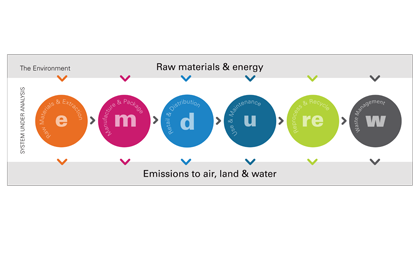
Life Cycle Inputs and Outputs View PDF
‘Life cycle thinking’ is an extension to our product development process and is a part of all development projects undertaken at Locus Research.
The life cycle of a generic industrial product was defined by SETAC (1991) as being composed of the following stages:
-
Raw Material Acquisition – all activities necessary to extract raw material and energy inputs from the environment, including the transportation prior to processing.
-
Processing and Manufacturing – activities needed to convert the raw material and energy inputs into the desired product. In practice this stage is often composed of a series of sub-stages with intermediate products being formed along the processing chain.
-
Distribution and Transportation – shipment of the final product to the end user.
-
Use, Reuse, and Maintenance – utilization of the finished product over its service life.
-
Recycle – begins after the product has served its initial intended function and is subsequently recycled within the same product system (closed-loop recycle) or enters a new product system (open-loop recycle).
-
Waste Management – begins after the product has served its intended function and is returned to the environment as waste.
Life Cycle Thinking encourages a wider view during the development of products and services; moving beyond considerate material selection and into consumer behaviour and end of life scenarios.
Locus Research has pioneered the constructive and proactive use of life cycle thinking in product development firstly in New Zealand and then further afield. This has been achieved by adopting and adapting life cycle thinking to design, making it work for us in the real world.
This has migrated toward the creation and use of more design driven techniques for Life Cycle Thinking. Which have been explored in the Life Cycle Thinking workshop series.
Our involvement with science has enabled the development of strong relationships within the Life Cycle Assessment, Management and Accounting fields. We are an active member of the Sustainable Design Group of New Zealand and the Life Cycle Association of New Zealand.
